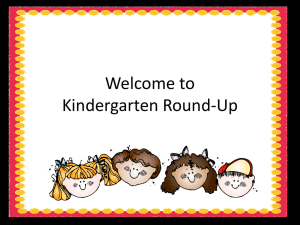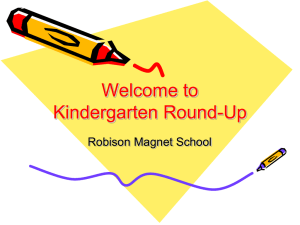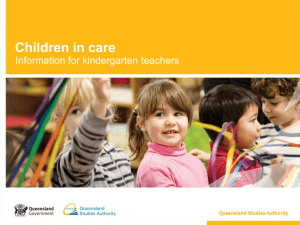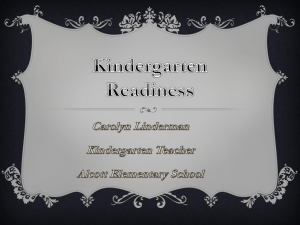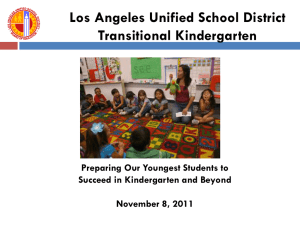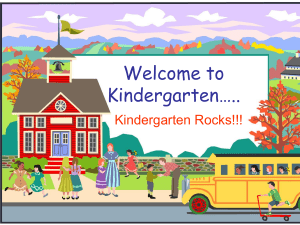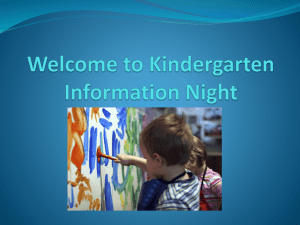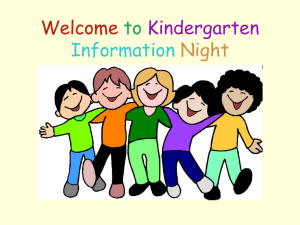Norfolk Island Central School Kindergarten 2014 Information Evening
advertisement
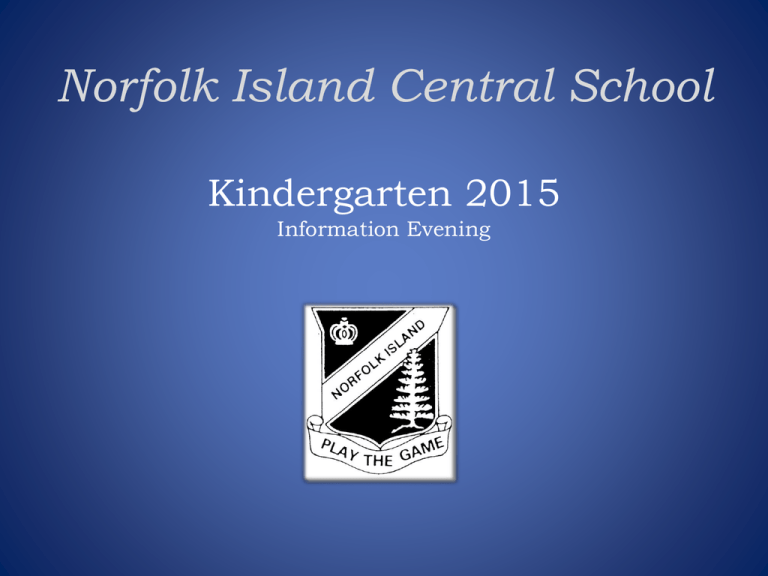
Norfolk Island Central School Kindergarten 2015 Information Evening Is my child ready to start school? There are many factors to consider when determining school readiness… Age In NSW students may begin school if they turn 5 by July 31st of the year they start All children must attend school by the time they have turned 6 Social and emotional competence 1. Individual attributes: positive attitude, willingness to come to school, empathy, positive relationships with peers, humour and resilience 2. Social skills: positive interaction with peers, ability to explain actions, assertive behaviour, ability to enter a group, expression of frustration and anger in a mature way, turn taking, ability to compromise 3. Peer relationship attributes: acceptance from others, relationships with peers, being named by other children as a friend Emotional adjustment may be indicated by students who have good social skills and are able to separate from their caregivers easily Physical and motor development Research indicates that being well coordinated and physically healthy contributes to school readiness Language and cognitive skills Research indicates that students who use language effectively to communicate and are “intellectually inquisitive” will find it easier to adapt to the school environment Independence Skills that reflect independence contribute towards school readiness Examples Going to the toilet Dressing Tying shoe laces Unwrapping lunch Is my son ready to start school? Research suggests boys are more likely to ‘not be ready for school’ than girls In particular boys may have more difficulty with writing their names, recognising numbers and letters and tying their shoe laces, and may find it more difficult to express themselves clearly Some researchers recommend delaying the entry of immature boys What can I do to help my child’s transition to school? Help your child be comfortable within the school surroundings: Ensure your child attends the Kindergarten Orientation Sessions Talk about the school, your child’s teacher and buddies with your child Let your child become familiar with the uniform and equipment needed Bridge the gap between home and school If you can, be part of the arrival and departure at school If you have time, come and help at school in the classroom Become involved within the school community Be positive about school and the teachers Encourage your child to talk about school at home: Give your child opportunities to discuss his/her day Know your child’s classroom routine so you can ask about what has happened that day Accept that there are more enjoyable times and less enjoyable times at school It is unrealistic to expect your child to love every minute at school Know what is happening in the classroom and at school Read the school newsletter, visit the school website Use the resources suggested Talk to the classroom teacher Check your child’s diary Check the K-2 notice board What is the Kindergarten Transition Program? 2015 Kindergarten students are invited to take part in our Kindergarten Transition Program Students are encouraged to attend 5 sessions on Mondays from Week 3 – 20 October until Week 8 - 24 November . Sessions will start at 10am and finish at 11 noon The Transition sessions allow new students to meet the teachers and other students Allow teachers to observe new students and make any adjustments to class arrangements New students take part in introductory activities Students who attend Banyan Park Play Centre and Mini School will be brought to (and from) school by pre-school staff If your child does not attend Banyan Park Play Centre or Mini School, please bring your child to the area outside the school canteen shortly before 10 am Each new kinder will be introduced to their buddy who will escort them into the classroom Pick up at 11 o’clock outside the school canteen – your child will be waiting with their buddy This will be the routine on the first day of school. Familiarization with this routine will assist our new Kinders to have a smooth transition on their first day! What is Best Start? (PLAN) Children start Kindergarten with different skills and experiences The Best Start Literacy and Numeracy initiative is a NSW state-wide assessment program designed to support teachers in meeting the individual learning needs of students at the beginning of kindergarten Kindergarten teachers will sit with each child and observe and record student responses individually In 2015, assessments will occur on Wednesday 28th January The emphasis is on gathering information so that teachers can develop and implement teaching and learning programs that meet the individual needs of students What happens on the first day of school for Kindergarten? Please bring your child to the open area outside the Kindergarten classrooms at 11 am on Thursday 29th January. Your child’s buddy will meet you. Please say a quick goodbye. A prolonged goodbye may make your child feel more nervous. Your child’s buddy will take your child and lead them into the K/1/2 home classrooms to hang up bags and play with the toys. (Please don’t come in the classrooms or into the hallway.) Meet the Principal for a cup of tea and piece of cake at the Kindy Parents’ Morning Tea outside the Library. (Tissues provided!) At 2.30pm you are invited into the classroom so your child can show you what he/she has done that day. This is a good time to take photos. On the following day (Friday 30 January) your child will start school at 9am and finish at 2.50 pm. We suggest a similar routine to the first day of school to ensure a successful transition - a quick goodbye in the morning and a longer welcome in the afternoon! If your child is obviously upset, please leave him/her in the care of the teachers. We find that usually after a few minutes once parents have gone your child will settle down. We will contact you if your child continues to be upset for a prolonged period Parents are welcome to collect new Kinders at 2:30 each day for week 1 and 2 What class will my child be in? The K-2 classes are housed in the historic block of the school There are currently four multi age classes in the K-2 section called home classes The current four home teachers in 20134 are Mrs Pedel (Assistant Principal), Mrs Hayes and Mr Hayes, Mrs Brown and Ms Delaney Kindergarten students will be with Year One and Year Two students in their home classes for part of the day Students currently move between all four classrooms for literacy and numeracy groups for part of the day so their individual needs can be met K-2 students combine for music, sport programs and performing arts activities What equipment does my child need for Kindergarten? NICS school uniform and sports uniform school bag hat - a broad brimmed sun safe hat is best lunch box with a healthy packed lunch and recess a drink bottle filled with water raincoat (kept always at the bottom of the bag) spare undies (kept always at the bottom of the bag) painting smock - an adult’s old T-shirt is ideal a zippered clear plastic bag for home reading a large cloth bag for library a small pencil bag with textas 2 large glue sticks large box of tissues for classroom iPod headphones for iPod and computer use large sheet of cardboard for art folder diary for recording home readers - available from School Uniform Shop Please make sure everything is clearly named. Students need to take responsibility for their belongings. A lost property box is located near the Kindergarten classrooms. The school will provide pencils and work books. At different times students may be asked to donate glue sticks, rubbers and extra tissues Please do not encourage students to bring toys to school as they may get lost, broken or stolen. “Everything I need to know... I learned in kindergarten.” ― Robert Fulghum, All I Really Need to Know I Learned in Kindergarten We look forward to sharing your child’s school journey!

